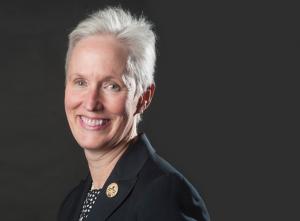Policies Trigger State Actions, Reactions
Since April 2014, Sue Kelly has been president and CEO of the American Public Power Association – the voice of not-for-profit, community-owned utilities that power 2,000 towns and cities nationwide. Earlier, she was the senior vice president, policy analysis and general counsel. Under Kelly’s leadership, the association has advocated on wholesale electric market issues, worked to strengthen cybersecurity awareness and resources for utilities and raised the profile of public power in Washington, D.C.
Newton's third law of motion seems to be applying in full force when it comes to environmental and wholesale capacity market policies. For every action at the federal level, equal and opposite reactions are being triggered in the states.

On climate change and wholesale electric capacity markets, some states are concerned that federal policies are not supporting the types of energy resources they believe they need. Those states want to reduce carbon dioxide emissions, achieve fuel diversity, or provide for baseload generation. And they are acting to address the gaps they perceive.
Clean Power Plan
The executive order "Promoting Energy Independence and Economic Growth," issued by the Trump administration in March 2017, outlines an energy policy framework intended to minimize regulatory burdens and protect American workers, national security, the environment, and the rule of law.
Among other things, the executive order calls for a "review" of the Clean Power Plan. A proposed rule to that effect, at time of writing, is currently under interagency review at the White House Office of Management and Budget. The administration has also announced plans to cut the Environmental Protection Agency's budget, review climate science, and pull the U.S. out of the Paris climate agreement.

